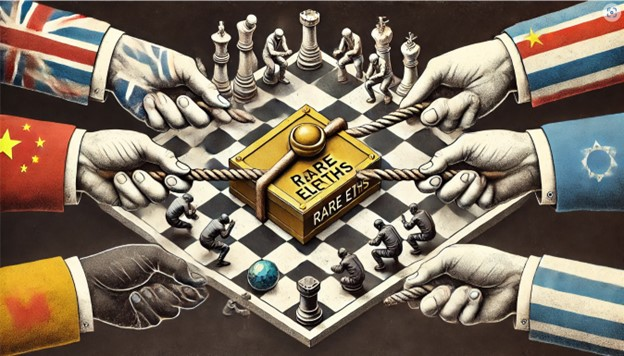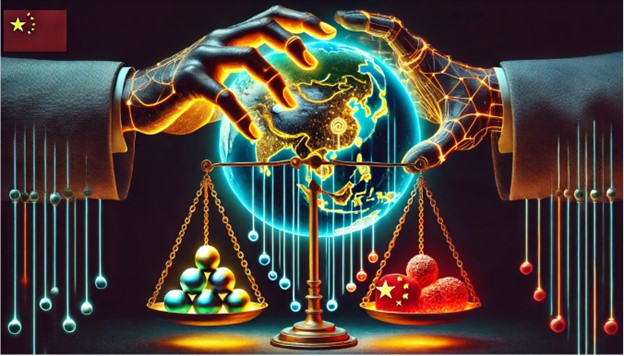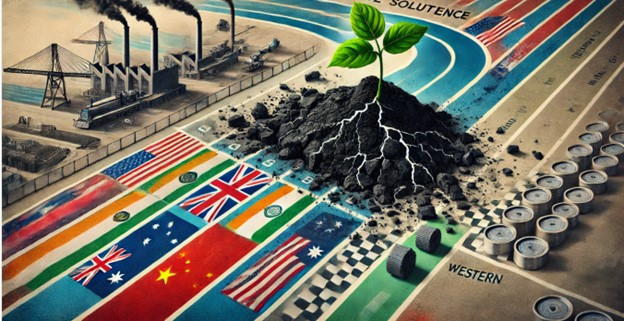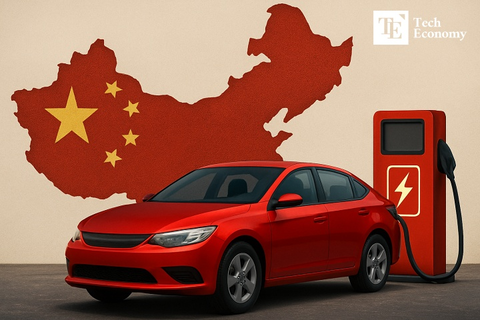The Global Consequences of China's Strategic Control Over Rare Earth Elements
Input
Modified
The Global Consequences of China's Strategic Control Over Rare Earth Elements China's Growing Influence in Global Rare Earth Mining The Future Outlook and Global Response

The Global Consequences of China's Strategic Control Over Rare Earth Elements
The global supply chain of rare earth elements (REEs), a group of 17 critical minerals that are essential for contemporary technologies, has been dominated by China for an extended period. These components are essential for the manufacture of consumer electronics, renewable energy technologies, electric vehicle (EV) batteries, and military applications. China maintains control over 70% of the global supply and 77% of the refining capacity, despite possessing only 36% of the world's rare earth reserves. This near-monopoly provides China with significant influence over global trade, particularly in the context of geopolitical disputes.
In recent years, China has heightened its efforts to acquire rare earth resources from other countries. Myanmar, Vietnam, Morocco, and the Democratic Republic of Congo (DRC) are among the countries from which Chinese corporations have increased their mineral procurement. Beijing's continued dominance in rare earth refining is guaranteed by this expansion, which renders it the preferred supplier for nations that rely on these minerals.
One of the most significant concerns regarding China's control over REEs is its use as a geopolitical instrument. In response to the restrictions imposed by the United States and other Western countries on Chinese products, China has strengthened its control over critical minerals exports. Beijing prohibited the export of gallium, germanium, and antimony to the United States in December 2023. These minerals are crucial in the production of semiconductors, military applications, and advanced electronics. Analysts caution that if trade tensions continue to escalate, China may broaden its export restrictions to encompass rare earths, thereby further disrupting global supply chains.
China's refining capacity is another critical factor that contributes to its dominance. Although various countries, such as the United States, India, and Australia, possess substantial rare earth reserves, they are unable to refine these minerals into usable forms due to a lack of processing infrastructure. This results in their dependence on China, despite the fact that they extract basic materials domestically. China has maintained an unparalleled competitive advantage in the rare earth market due to the sluggish pace of alternative refining facility development.

China's Growing Influence in Global Rare Earth Mining
China's control over the rare earth industry has been fortified by its strategic investments in mining operations worldwide. This is most clearly demonstrated in the Democratic Republic of the Congo (DRC), which supplies 70% of the world's cobalt, a critical component of electric vehicle (EV) batteries and high-performance electronics. The majority of the cobalt mines in the Democratic Republic of the Congo are under the control of Chinese companies, which guarantees that China remains at the vanguard of the electric vehicle revolution. This monopoly on cobalt mining renders it virtually impossible for Western automakers to manufacture electric vehicles (EVs) without relying on Chinese supply chains.
In the same vein, China has extended its influence into Myanmar, a nation that possesses substantial reserves of heavy rare earth elements. China has been afforded the opportunity to negotiate directly with rebel-controlled mining regions as a result of the ongoing conflict between Myanmar's military junta and rebel groups. Kanpaikti, a critical rare earth mining town situated near the Chinese frontier, was captured by the Kachin Independence Army (KIA), a formidable rebel organization. China has emerged as the primary purchaser of Myanmar's rare earth minerals, circumventing the military junta that governs the country, as KIA maintains control. This action enables China to negotiate more favorable trade terms with the new power holders while simultaneously preserving its supply chain dominance.
China is making substantial investments in Morocco's electric vehicle sector in North Africa. The recent visit of President Xi Jinping to Morocco underscores China's dedication to the expansion of its rare earth and electric vehicle supply chains beyond Asia. Gotion High-Tech, a Chinese battery manufacturer, has committed $1.3 billion to the construction of Africa's first EV battery gigafactory in the vicinity of Rabat. Morocco is being established as a center for Chinese-manufactured electric vehicles (EVs) as a result of the establishment of production facilities for battery components by other Chinese companies. According to analysts, this approach will enable China to circumvent European Union (EU) tariffs on Chinese-made electric vehicles (EVs) by assembling them in close proximity to European markets.
Citing unjust subsidies that provide Chinese manufacturers with an advantage, the EU recently implemented tariffs on Chinese electric vehicles that ranged from 17% to 35.3%. China can circumvent these tariffs and expand its presence in the European auto market by manufacturing electric vehicles in Morocco. This action has prompted apprehension among European manufacturers, including Volkswagen, Mercedes-Benz, BMW, Renault, and Stellantis (formerly Fiat-Chrysler), who are currently competing with low-cost Chinese electric vehicles.

The Future Outlook and Global Response
Several countries are adopting measures to reduce their dependence on Beijing's supply chains in response to China's increasing control over rare earth elements. The United States, Australia, and India are among the nations that are attempting to develop domestic rare earth mining and refining capabilities in order to counteract China's dominance.
One of the most promising developments is the University of Texas at Austin, where researchers have discovered 11 million tons of rare earth elements in U.S. coal waste deposits. This figure is eight times the country's current known reserves. Coal ash extraction is more energy-efficient and less environmentally destructive than traditional mining, as the minerals have already been separated from their initial ore during the burning process. Coal ash has the potential to revolutionize America's rare earth strategy, as the economic value of these rare earth elements is estimated to be $8.4 billion.
Nevertheless, the discovery presents a thrilling opportunity; however, the transformation of coal ash into a commercially viable rare earth resource remains a challenge. To compete with China's well-established supply chain, the United States must develop efficient extraction technology, scale up production, and establish a specialized workforce. Pilot projects, including those conducted at the National Energy Technology Lab, are currently investigating methods for extracting rare earth elements from coal ash in the Powder River Basin. Although this research is still in its infancy, it has the potential to offer the United States a much-needed alternative to Chinese imports.
Additionally, other nations are intensifying their endeavors to undermine China's monopoly. Lynas Rare Earths, a company that is constructing processing facilities outside of China, has been instrumental in the increase in rare earth production in Australia. India is in the process of establishing new mining partnerships with the United States and Australia in order to secure critical minerals, as it has substantial untapped rare earth reserves. In response to the escalating trade tensions between Beijing and Brussels, the European Union is investing in domestic refining capacity to decrease its dependence on Chinese suppliers.
In the short term, it is unlikely that China's dominance in rare earth supply chains will be challenged, despite these efforts. Beijing enjoys a substantial advantage due to the global refining deficit, logistical complexities, and China's extensive influence over alternative suppliers. Nevertheless, Western nations are being compelled to diversify their supply sources in response to the growing demand for advanced technology, renewable energy, and electric vehicles.
In the future, the rare earth sector will continue to be a critical battleground in global trade and geopolitics. The leverage of China over critical minerals could be diminished if the United States and its allies effectively establish alternative supply chains. Nevertheless, China will continue to dominate the global rare earth market for decades to come if it continues to bolster its control over mining and refining operations on a global scale. In either scenario, the future of technology, energy, and international trade will be significantly influenced by rare earth elements.





















